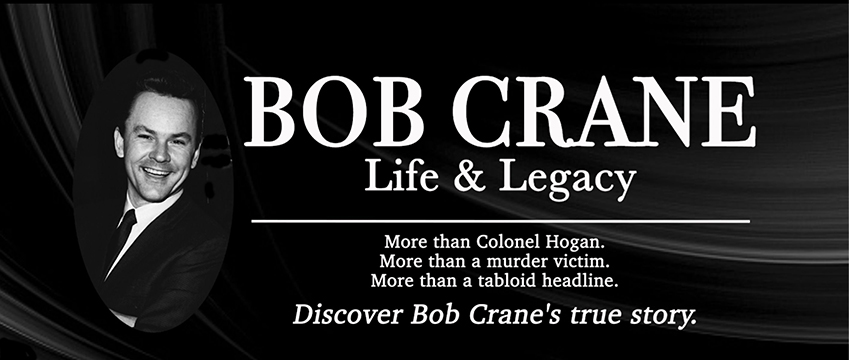by Carol Ford
 |
Bob Crane, circa 1965
Click on the photo to enlarge.
|
"He brightened everybody's life. Really, he was so witty. So original." -George Cukor, August 3, 1968, talking about Bob Crane and his radio work at KNX.
On the evening of June 28, 1978, Bob Crane had finished a showing of his play, Beginner's Luck, in Scottsdale, Arizona. The crowds adored the star of Hogan's Heroes, and they flocked to see him in his live theatre performances in dinner theatres across the country. Following the evening's performance, Bob did his usual stand-up routine for the audience, and after which, he remained in the lobby for awhile signing autographs. Bob loved his fans, and he thoroughly enjoyed meeting them and signing autographs any chance he had. In addition, his daughter, Karen, had just graduated from high school, and he had attended her graduation ceremony in Los Angeles the week prior. His wife, Patty, and their son, Scott, had also just spent time with him in Scottsdale over Father's Day, and he was choked with emotion at the gift he had received - a framed picture of Scott.
But later that night, things took a tragic turn for Bob. After the play, he and his friend, John Henry Carpenter (different from the film director) went to Bobby McGee's, a local restaurant, where, according to a waitress in her 1994 court testimony, the pair had engaged in an intense but otherwise normal conversation. Bob returned to his apartment with Carpenter. He spoke with his wife, Patty, as well as with his mother, by phone. Then, at some point during the early morning hours of June 29, 1978, Bob Crane was murdered as he slept. From the outset, John Carpenter was the primary suspect, and he eventually stood trial in 1994. He was acquitted due to lack of sufficient evidence that could prove he committed the crime beyond reasonable doubt. The case now cold, Bob's murder remains officially unsolved to this day.
Who killed Bob Crane and why will perhaps always remain a mystery. When his body was discovered in the afternoon of June 29, it sparked a media frenzy, not only about his gruesome murder, but also about his lifestyle. Without any attempt to understand why or to go deeper into Bob Crane as a person, the focus shifted to his proclivities to sex. The jokes began at the crime scene over his lifeless body, and they continue to this day.
However, for years, Bob had been struggling with a destructive force in his life. What he had convinced himself as being just the lifestyle of "a normal, red-blooded guy" had taken over, and he no longer could control it. In the months leading up to his death, Bob had been talking a great deal with Rev. Edward Beck, whom he knew as the manager of the Windmill Dinner Theatre circuit, where his play Beginner's Luck had shown in Scottsdale and other cities in the United States. Rev. Beck was a counselor, and during their conversations, Bob confessed that he had tried for several years to stop his addictive sexual behaviors on his own. When he realized that he could not, it shook him. He was in trouble. He knew it, recognized it as an addiction, and wanted out of it. He was seeking serious professional help. He planned to destroy the pornographic tapes he had made with consenting adult women when he returned home to Los Angeles after his play wrapped in just a few days. He intended to start his life over. With several new television projects in the works and a commitment to turn his life around, he was well on his way to making a comeback.
But Bob never made it home.
People claim they know Bob Crane because they viewed the film Auto Focus. To me and to those who knew Bob intimately (nearly 200 of whom have talked with Dee Young, Linda Groundwater, and me for Bob's new biography), Auto Focus is a disgrace. Bob was much more than this film or the media have made him out to be since his death.
Addiction is not pretty. The struggle to overcome addiction is difficult and painful, and it is an ongoing process. One does not simply "recover" from an addiction. It is always there, waiting for a weak moment, to resurface. One who suffers from any form of addiction must battle it daily, constantly struggling to keep it from regaining control. Overcoming addiction is courageously accepting and dealing with the pain that caused the addiction in the first place. This is what Bob Crane had committed to doing, and for this, he should be commended, not ridiculed.
Bob Crane was neither a devil nor a saint. He was human. He had faults. He had weaknesses. He had strengths. He had virtues. He was not perfect, but he sought warmth and understanding and love and compassion. He was a man who loved to laugh. He loved life. He loved his work as a radio personality and an actor. He loved his music, and especially, his drums. He loved his family and his friends. He loved both his first and second wives dearly. And he loved and adored his children more than anything. He squeezed every second he could out of his short life of 49 years, and he left us much too soon.
On this day we mourn the 35th anniversary of his passing, but we also must remember his true legacy - to laugh, to smile, to work hard, to be kind, and to be a ray of sunshine in this often tired and weary world. This is what Bob Crane would have wanted, and this is how Bob Crane should be remembered.
